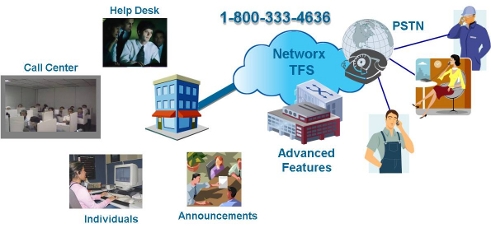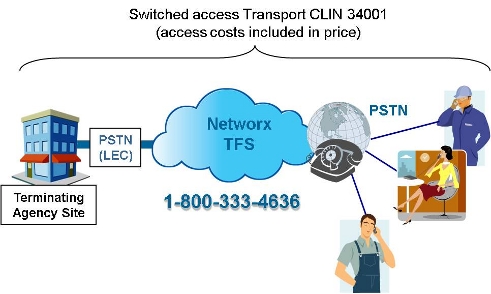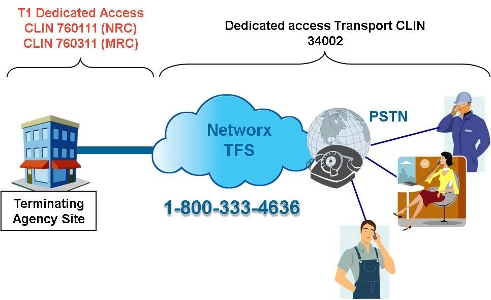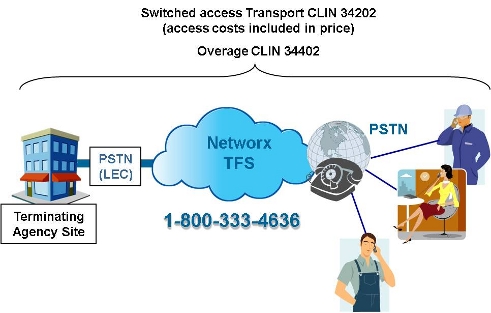TFS is an inbound voice service which provides a toll free number (no charge to caller) with advanced features and routing capabilities that can be used by an Agency to provide enhanced customer service. TFS capabilities include voice applications, network based Interactive Voice Response (IVR) announcements, call routing to the appropriate party, and caller self service options to effectively manage inbound calls for delivering services to the Agency's callers.
TFS may be ordered as a domestic (CONUS and OCONUS) or non-domestic service with numbering consistent with toll free codes standards in the country in which the call originates.
The diagram below shows a typical TFS configuration. TFS can be used for individuals, help desks and call centers, to provide access to recorded announcements, access to voice mail service, or to provide a telephone number for an individual. TFS connects to and interoperates with the Public Switched Telephone Network (PSTN) including both wireline and wireless transport. TFS utilizes the underlying Voice Service (VS) for connectivity and is offered for both dedicated and switched terminating access arrangements.

Typical TFS Configuration
TFS provides a similar capability to FTS2001 Toll-Free Service. TFS will support the full range of technical capabilities that are available in commercial offerings. These include an intelligent call routing capability to meet an Agency's specific needs. An Agency can use presently assigned toll free numbers or request "vanity" toll free numbers (e.g., 1-800-CALL GSA) which will be provided if available. TFS supports portability of the assigned toll free number and can deliver inbound calls to a single site or to multiple sites. A brief summary of the other TFS technical capabilities is presented below:
TFS also provides a wide range of service features that are listed below and described in the Networx Contracts Section C.2.2.3.2.1 Toll-Free Service Features:
Each Networx contractor may provide variations or alternatives to the offering and pricing for TFS. The specific details can be found within each Contractors Networx contract files and pricing notes for TFS.
For more information on the general TFS specifications and requirements, please refer to Section C.2.2.3 of the Networx contract for technical specifications and Section B.2.2.3 for pricing.
TFS provides a similar capability to FTS2001 Toll-Free Service. TFS provides basic inbound toll free calling with added capabilities to enable Agencies to effectively manage inbound calls. It includes options for termination of calls for the toll free number over either dedicated access or switched access arrangements. Calls can be either:
Price components required for full end-to-end service for Domestic and Non-Domestic to Domestic TFS:
* Some or all price components are priced on an Individual Case Basis (ICB). CLINs with ICB prices are not available in the unit pricer.
Example 1: TFS with Switched Access Termination

Example 2: TFS with Dedicated Access Termination

A payphone add-on charge applies to toll-free calls placed from payphones. The payphone add-on charge does not apply to calls placed from payphones paid for by inserting coins during the progress of the call.
Flat rate pricing is provided on a per Service Delivery Point (SDP) basis, for call between locations in CONUS, Alaska, and Hawaii. Flat rate pricing packages are available based upon blocks of minutes used per month. Overage usage charges occur if the maximum monthly minutes are exceeded.
Price components required for full end-to-end service for Flat Rate TFS:
Example 3: Flat Rate TFS for up to 10,000 minutes

Each Networx contractor may provide variations or alternatives to the offering and pricing for TFS. The specific details can be found within each Contractors Networx contract files and pricing notes for TFS.
For more information on the general OWS specifications and requirements, please refer to Section C.2.2.3 of the Networx contract for technical specifications and Section B.2.2.3 for pricing.